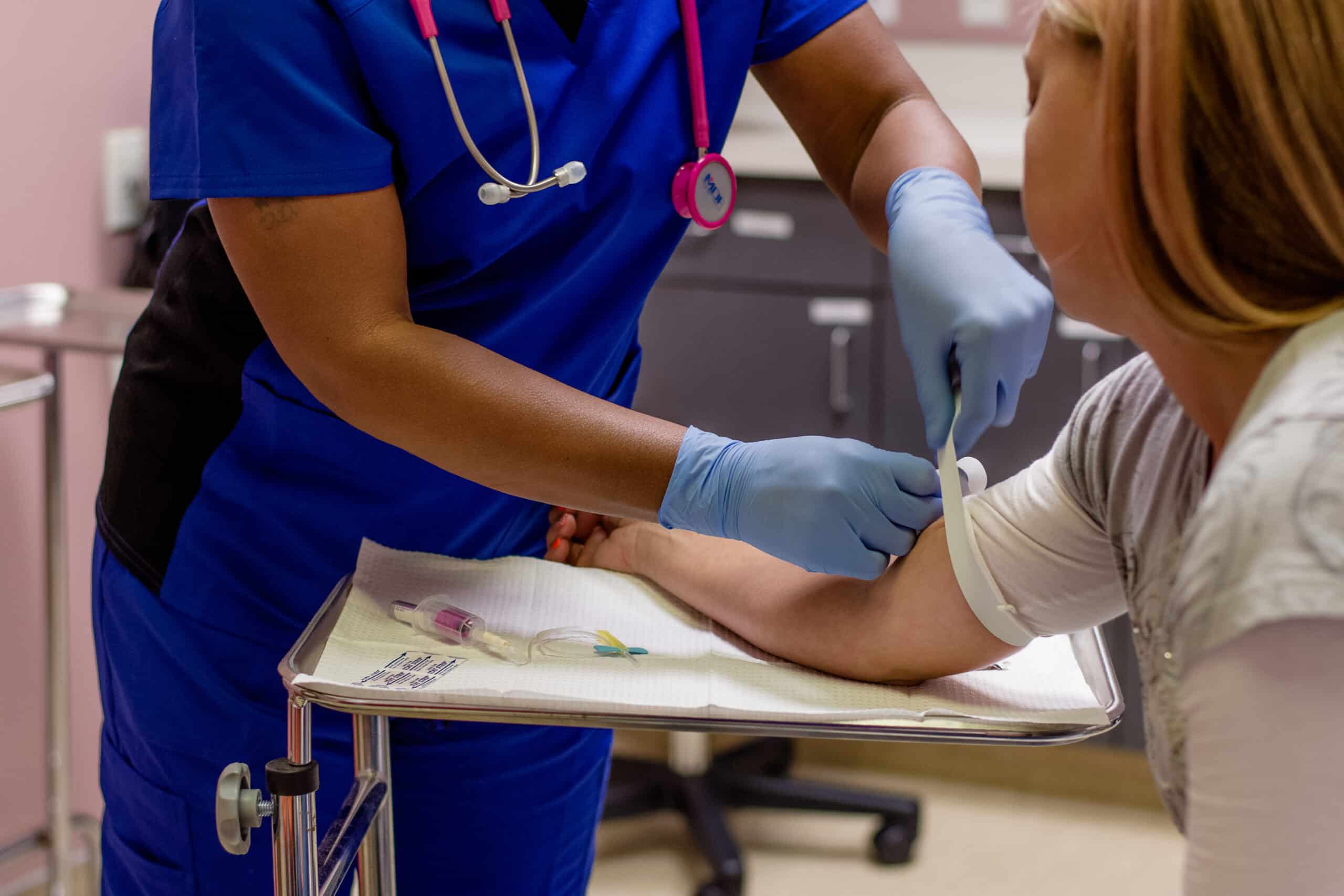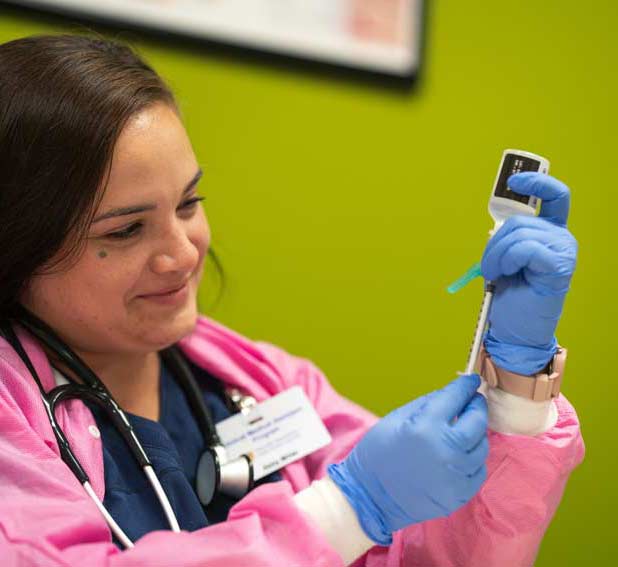How a Phlebotomy Training Course Sets the Stage for a Successful Healthcare Career
How a Phlebotomy Training Course Sets the Stage for a Successful Healthcare Career
Blog Article
Exploring the Crucial Skills Gained From a Phlebotomy Training Course for Aspiring Professionals
In a phlebotomy training course, you'll gain essential abilities that exceed simply injuring. You'll understand venipuncture methods and find out the value of safety and security methods. You'll likewise create the capacity to communicate successfully with patients, which can alleviate their anxiousness. There's more to it-- understanding makeup and managing laboratory devices are just the beginning. What other important skills can you anticipate to acquire as you get ready for a job in this area?
Understanding Venipuncture Techniques
Understanding venipuncture techniques is important for anyone going after a profession in phlebotomy. It's all concerning being confident and gentle while managing patients.
You should familiarize yourself with the numerous needle sizes and kinds, as picking the best one can make a difference in comfort and effectiveness. Throughout the procedure, you'll discover to clean the site correctly to reduce infection dangers.
Exercising the real draw will assist you comprehend the importance of angling the needle correctly to access the vein without triggering unneeded pain. By fine-tuning these skills, you'll not only gain the trust of your clients yet additionally ensure effective blood draws, making you a proficient phlebotomist ready for the demands of the job.
Understanding Safety Protocols
As you perfect your venipuncture methods, it's similarly vital to focus on safety procedures to protect both yourself and your patients. Acquaint on your own with infection control steps, like correct hand health and the use of personal safety tools (PPE) Constantly put on handwear covers when taking care of blood samples, and change them between people to minimize contamination danger.
You must additionally understand just how to handle and get rid of sharps safely. Utilize assigned sharps containers and follow regional standards for biohazard garbage disposal. Comprehending these methods not just maintains you safe however additionally guarantees your people.
In addition, remain updated on emergency procedures, like what to do in situation of a needle stick injury or a negative response (Phlebotomy school). Normal training and refreshers on safety protocols will certainly boost your confidence and assure you're always prepared. By grasping these precaution, you add to a more secure healthcare environment for everybody included
Creating Individual Communication Skills
In phlebotomy, developing rapport with clients is important for a positive experience. You'll require effective communication strategies to aid alleviate their concerns and manage any kind of anxiousness they may feel. By concentrating on these skills, you can develop an extra comfortable atmosphere for both you and your individuals.
Building Connection With Patients
Structure connection with clients is essential for effective phlebotomy practice. When you create a connection, patients feel more comfy and secure during procedures. Start by greeting them warmly, making eye contact, and using their name. Program real interest in their well-being and listen proactively to their concerns. This strategy assists to alleviate stress and anxiety and builds trust fund. Keep in mind, your body language plays an important function; preserve an open pose and smile to strengthen your kindness. Share a brief, comforting description of the procedure to aid debunk the process. By focusing on relationship, you not just enhance the client experience but also boost the precision of your job, making sure that they're unwinded and cooperative throughout blood draws.
Effective Interaction Techniques
Effective communication strategies are vital in phlebotomy, given that they aid you get in touch with patients and guarantee a smoother experience. To create your individual interaction skills, concentrate on using clear and concise language. Constantly introduce yourself and clarify your duty, making certain people feel comfortable and notified. Proactively listen to their worries and concerns, as this shows you value their input.
Use non-verbal hints, like preserving eye call and offering a warm smile, to build depend on. Be understanding and client, specifically with those who might be nervous concerning the treatment. Tailor your interaction design to each person, adapting my response to their level of understanding. Exercising these techniques will improve your capacity to involve with clients effectively and develop a favorable environment throughout their check outs.
Managing Person Anxiousness
While it's natural for people to feel distressed regarding blood attracts, you can play a crucial duty in easing their concerns. You can also supply distractions, like speaking about light subjects or giving an anxiety ball to capture. Assurance they're comfy and sustained throughout the process, as a positive interaction can significantly lower their anxiousness and foster trust in your skills as a phlebotomist.
Learning Composition and Physiology
Understanding anatomy and physiology is important for grasping phlebotomy abilities, as it helps you understand the body's framework and functions. You'll learn more about the blood circulation system, including capillary, arteries, and blood vessels, which is important for situating veins during blood attracts. Acquainting on your own with the different kinds of blood cells and their duties will certainly enhance your capability to discuss procedures to clients and recognize examination outcomes.
In addition, grasping the value of different physiological landmarks will make you extra reliable in identifying the very best websites for venipuncture. You'll likewise discover exactly how the body responds to injury his response and the healing procedure, which can inform your method.
Taking Care Of Lab Tools
Handling lab tools is vital for ensuring exact outcomes and a safe workplace. You require to remain on top of maintenance techniques and follow safety protocols to stop mishaps. By focusing on these practices, you'll improve your performance as a phlebotomist and shield both yourself and your clients.
Tools Maintenance Techniques
Correct upkeep of laboratory tools is essential for ensuring precise test outcomes and the security of both individuals and personnel. To keep your equipment in leading form, start by cleaning it on a regular basis. Wipe down surface areas and components to stop contamination and wear. Look for any signs of damage or breakdown, and address these issues promptly. Calibrate your tools according to the maker's guidelines to keep precision. Furthermore, maintain a log of maintenance tasks and examinations to track performance with time. Establish all materials, like needles and tubes, are kept properly go to my site to lengthen their life expectancy. By developing a regular for tools treatment, you'll enhance dependability and performance in your laboratory techniques.
Safety Methods in Labs
While it is vital to keep laboratory equipment, adhering to security procedures is similarly crucial to secure every person in the laboratory. Constantly put on proper personal safety equipment (PPE), like handwear covers and goggles, to decrease direct exposure to harmful products. Acquaint yourself with the area of security equipment, such as eyewash terminals and fire extinguishers, ensuring they're obtainable.
Carrying Out Quality Control Procedures
Implementing quality assurance procedures is crucial for making sure the precision and dependability of phlebotomy practices. You require to frequently calibrate and maintain your equipment, as even small disparities can lead to significant mistakes in results. Establishing a constant procedure for example collection, managing, and storage is vital. Make certain you're acquainted with the correct procedures for labeling examples, as this helps prevent mix-ups and misidentifications.
Carrying out routine audits of your processes can highlight locations needing improvement and strengthen best techniques. You ought to additionally take part in recurring training to remain updated on the newest strategies and innovations in the area. Urging responses from colleagues can develop a society of synergy, where everybody is bought keeping top quality standards. By focusing on quality assurance, you not only enhance your own abilities but also add to better individual results and the total stability of the health care system.
Browsing Legal and Ethical Considerations
As you browse the complex landscape of phlebotomy, comprehending the lawful and ethical considerations is crucial for your practice. You'll need to familiarize yourself with laws pertaining to person approval, confidentiality, and handling of biological products. Always make sure you have actually notified authorization from people before carrying out any type of procedures. This not only secures their civil liberties yet likewise develops trust fund.
Morally, you should appreciate patient personal privacy and keep privacy in all times. Be conscious of the Medical insurance Portability and Liability Act (HIPAA) laws, which govern the handling of sensitive wellness information.
Furthermore, stay upgraded on your center's plans and treatments to assure conformity with regional regulations and requirements. When doubtful, consult your manager or lawful sources - Phlebotomy Courses Near Me. By prioritizing these lawful and honest aspects, you'll foster a safe atmosphere for patients and support the honesty of your profession
Regularly Asked Questions
What Career Opportunities Are Available After Completing Phlebotomy Training?
After finishing phlebotomy training, you can go after profession opportunities as a phlebotomist in healthcare facilities, centers, blood donation centers, or laboratories. You could additionally take into consideration duties in research or clinical aiding, broadening your expert perspectives.
Exactly how Long Does a Regular Phlebotomy Training Program Last?

Is Certification Called For to Function as a Phlebotomist?
Yes, qualification is typically called for to work as a phlebotomist. It shows your abilities and knowledge, making you more affordable in the task market. Companies typically prefer qualified candidates for these placements.
What Are the Expenses Linked With Phlebotomy Training Programs?
Phlebotomy training programs generally set you back in between $700 to $3,000, depending on the organization and place. You'll also require to budget plan for books, products, and accreditation examination fees, which can contribute to your overall expenses.
Can Phlebotomy Educating Be Finished Online?

Report this page